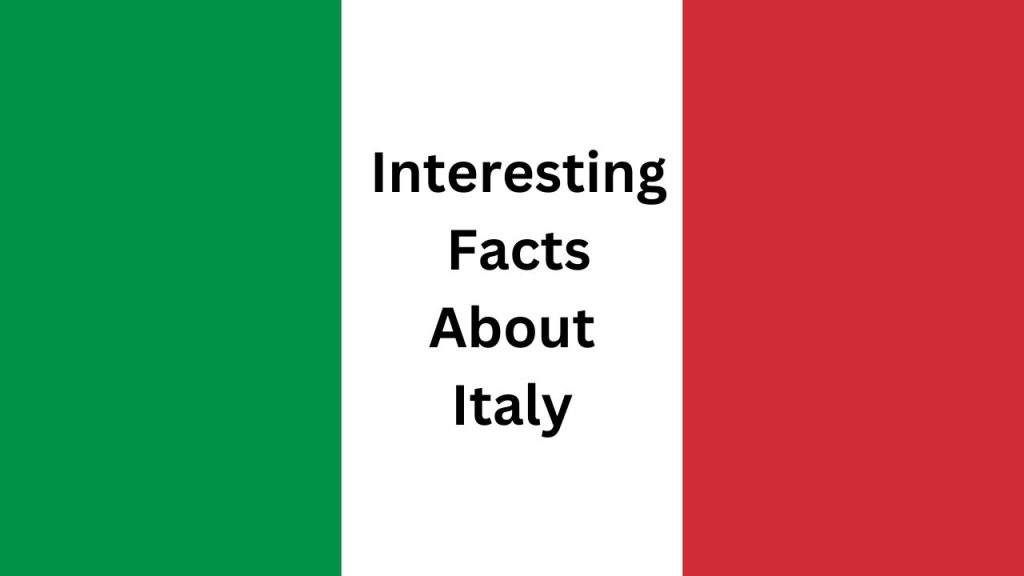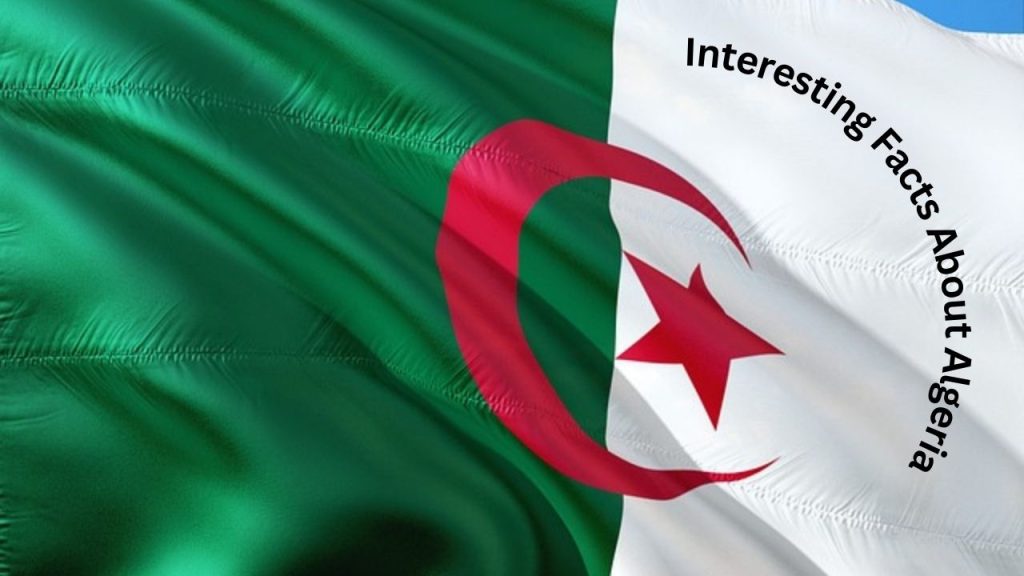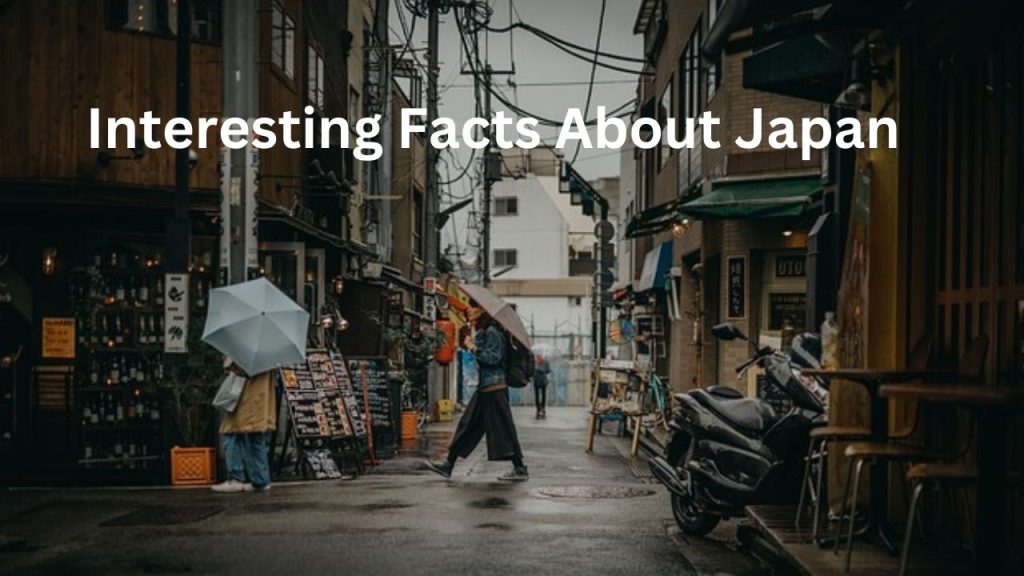Explore interesting facts about Italy, from its rich history and delicious cuisine to its stunning landmarks and vibrant culture. Discover what makes Italy truly unique!
Some Interesting Facts About Italy
Italy is a country that never ceases to amaze. Whether it’s the delicious food, the rich history, or the stunning landscapes, there’s always something captivating around every corner. From the ancient ruins of Rome to the canals of Venice and the fashion streets of Milan, Italy is a tapestry of vibrant cultures and fascinating traditions. Let’s dive into some of the most interesting facts about this beautiful country!
1. The Founding Site of the West
An very strong civilization in history, the Roman Empire, was based in Italy. The empire influenced world politics, architecture, and culture at its height, spanning three continents. Roman invention was either the source of many modern legal systems, highways, and towns, or it had a significant impact.
Actually, because of its lengthy and significant history, Italy’s capital, **Rome**, is frequently referred to as the “Eternal City”. With its **Colosseum** and **Roman Forum**, the city is home to several historical treasures, including the arena where gladiators once battled.
2. More UNESCO World Heritage Sites Are Found in Italy Than Any Other Nation
Italy is supreme when it comes to cultural riches! Italy tops the list with over **55 UNESCO World Heritage Sites**. These include historic sites like **Pompeii**, which was completely destroyed by volcanic ash from Mount Vesuvius in AD 79, and the breathtaking **Amalfi Coast**, which features colorful beach villages and towering cliffs.
The **Historic Center of Florence**, renowned for its Renaissance artwork and architecture, and the **Leaning Tower of Pisa** are two more noteworthy locations. There is something for everyone among Italy’s landmarks, regardless of your interests in art, history, or the outdoors.
3. A Food Lover’s Paradise

you think of Italy, one of the first things that comes to mind is the food—and for good reason! Italy’s culinary traditions are world-renowned, with dishes like pizza, pasta, and gelato winning over hearts and taste buds globally.
But did you know that pizza, as we know it, was invented in Naples? The classic **Margherita pizza**—with its tomato sauce, mozzarella, and basil—was created to represent the colors of the Italian flag.
Each region in Italy has its own specialties, too. In **Sicily**, you’ll find arancini (fried rice balls), while **Tuscany** is famous for its wine and hearty stews. **Pasta** dishes vary from region to region—Rome has its famous **carbonara**, while **Bologna** offers rich **ragu**. And let’s not forget about Italy’s **espresso** culture—a small, strong coffee that Italians drink throughout the day.
4. Venice: The Floating City
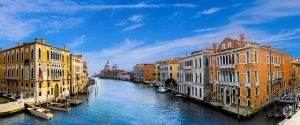
Venice is one of the most unique cities in the world. Built on a series of islands in a lagoon, this city is known for its intricate network of canals. The primary mode of transportation? Boats, of course! The iconic **gondolas** that glide through the waterways are a symbol of Venice, and the annual **Venice Carnival**, where people wear elaborate masks, is a highlight of the year.
However, Venice faces the challenge of rising sea levels and sinking land. The city is slowly sinking, and high tides, known as “**Acqua Alta**,” often flood parts of Venice, making it one of the most vulnerable cities in the world when it comes to climate change.
5. The Language and Dialects of Italy
There are other regional dialects spoken across Italy in addition to **Italian**, which is the official language of the nation. Due in significant part to the efforts of the renowned poet **Dante Alighieri**, who composed “The Divine Comedy” in this dialect, modern Italian is really derived from the Tuscan dialect.
The variety of Italian languages is immense, ranging from the melodious **Neapolitan** spoken in Naples to the unique **Sicilian** dialect. Particularly in tourist-heavy areas, many Italians are trilingual, speaking Italian, their regional dialect, and frequently English or French.
6. Fashion Capital of the World
Italy is synonymous with fashion. **Milan** is one of the “Big Four” fashion capitals alongside Paris, New York, and London. It’s home to **Milan Fashion Week**, one of the most important events in the fashion calendar, where top designers like **Versace**, **Prada**, **Gucci**, and **Armani** showcase their latest collections.
Fashion is deeply rooted in Italian culture. Italians are known for their impeccable style, and it’s common to see people in even the smallest of towns dressed to the nines. The Italian phrase “**la bella figura**,” which means making a good impression, reflects the emphasis Italians place on looking their best.
7. The World’s Tiniest Nation Is Found in Italy
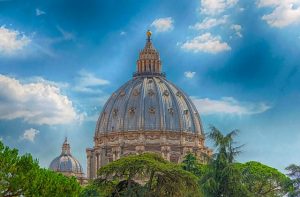
Tucked away in the heart of Rome sits **Vatican City**, the world’s smallest nation in terms of land and population. The Pope resides in Vatican City, which is home to Roman Catholics and spans slightly more than 100 acres. It’s also a veritable gold mine of art, home to **St. Peter’s Basilica**, the **Sistine Chapel** (including a Michelangelo ceiling), and the **Vatican Museums**, which house one of the most remarkable art collections in the world.
Vatican City is tiny, but it functions like a separate nation, complete with a radio station, postal service, and small army (the **Swiss Guard** ), which has been guarding the Pope since the 1500s.
8. Mountains, Beaches, and Everything in Between
Italy’s geography is incredibly diverse. The **Alps** in the north provide stunning views and world-class skiing, while the central region of **Tuscany** offers rolling hills, vineyards, and picturesque countryside. **Sicily** and **Sardinia**, Italy’s two largest islands, boast beautiful beaches, rugged coastlines, and warm Mediterranean weather.
The country is also home to several active volcanoes, including **Mount Vesuvius** (near Naples), **Mount Etna** (on Sicily), and **Stromboli** (on the Aeolian Islands). These volcanic areas have fertile soil, making them excellent for growing crops like grapes and olives, which contribute to Italy’s famous wine and olive oil industries.
9. The Importance of Family
Family is at the heart of Italian life. It’s common for multiple generations to live together or near each other, and Sunday meals are often large, joyous gatherings. Italians are known for their hospitality, and family values are an integral part of the culture.
It’s not just immediate family that’s important, but extended family too. Cousins, aunts, uncles, and even close friends are often treated like family. This strong sense of community helps create the warm and welcoming atmosphere that Italy is famous for.
10. Italy’s Fascinating Art History
Italy has been the birthplace of many of the world’s most famous artists. **Leonardo da Vinci**, **Michelangelo**, **Raphael**, and **Caravaggio** are just a few of the legendary names associated with Italian art. The Renaissance, which began in Italy in the 14th century, marked a period of incredible artistic and intellectual growth.
In fact, the city of **Florence** is often called the “Cradle of the Renaissance.” The famous **Uffizi Gallery** in Florence holds an incredible collection of Renaissance masterpieces, and Michelangelo’s **David**, a symbol of Renaissance humanism, stands proudly in the **Galleria dell’Accademia**.
11. A Country of Enthusiasts for Sports
Sports are very important to Italians, and **football (soccer)** is the most popular sport there. The **FIFA World Cup** has been won four times by the Italian national football team, nicknamed as the **Azzurri** due to their blue jerseys (1934, 1938, 1982, and 2006). Italian football teams with huge international fan bases include **Juventus**, **AC Milan**, and **Inter Milan**.
Beyond soccer, **cycling** is a passion among Italians. One of the three professional cycling Grand Tours, the **Giro d’Italia**, is a significant sports occasion that takes place in Italy each year. The world of Formula One and high-end automobiles is dominated by iconic brands like **Ferrari**, **Lamborghini**, and **Maserati**, demonstrating the Italians’ love of motorsports.
12. Italy’s Influence on Music
Italy has given the world some of its most iconic musical forms, including **opera**. Italian composers like **Verdi**, **Puccini**, and **Rossini** created operas that continue to be performed in theaters around the world. Even today, **La Scala** in Milan is considered one of the most prestigious opera houses in the world.
Let’s not forget Italy’s influence on classical music, with composers like **Vivaldi** and **Paganini** shaping the course of Western music. In addition to its rich classical tradition, Italy’s contemporary music scene also boasts international pop stars like **Eros Ramazzotti** and **Laura Pausini**.
Sure! Let’s wrap up this journey through Italy with a few more interesting facts and a heartfelt conclusion.
13. Italy: A Festival-Gifted Country
The love of festivals that characterizes Italian society is among its most fascinating features. Italy’s festivals are profoundly ingrained in its culture, whether they are honoring regional saints, signaling the passing of the seasons, or just enjoying delectable food and wine.
The **Venice Carnival**, when attendees don extravagant masks and costumes, is one of the most well-known celebrations. Another popular event is the **Palio di Siena**, a thrilling horse race held in Siena. In the Piazza del Campo, the city’s central plaza, each district of Siena competes in a race reminiscent of the Middle Ages during this celebration.
Every year, the **Battle of the Oranges** is held in the southern city of **Ivrea**, when competitors toss oranges at one another.
14. The Significance of the Italian Flag
The “Il Tricolore**,” or Italian flag, is made up of three vertical bands that are respectively green, white, and red. The hues have symbolic and historical meaning. The **white** denotes the snow-capped Alps, the **red** signifies the blood spilled throughout Italy’s liberation struggles, and the **green** depicts the plains and hills of the nation.
A more contemporary view, on the other hand, holds that crimson denotes compassion, white represents faith, and green represents hope. Regardless of perspective, the Italian flag is a potent representation of pride and solidarity in the country.
15. Italy Is the World’s Largest Wine Producer
For wine lovers, Italy is nothing short of paradise. It’s the **largest producer of wine** globally, with famous regions like **Tuscany**, **Piedmont**, and **Veneto** leading the way. Whether you’re enjoying a glass of **Chianti** from Tuscany, a **Barolo** from Piedmont, or a **Prosecco** from Veneto, Italian wines are known for their diversity and quality.
Italy produces around 60 million hectoliters of wine annually, and its wines are exported to countries all over the world. Many vineyards have been in the same families for generations, maintaining a strong tradition of winemaking that’s passed down through the ages.
16. Italian Coffee Culture

Italians take their coffee very seriously! **Espresso** is the drink of choice, and it’s typically enjoyed quickly while standing at the bar. Italians rarely drink cappuccinos after breakfast, and ordering one in the afternoon might earn you some strange looks! The coffee culture in Italy is all about simplicity and quality—there’s no need for complicated flavors or giant cups.
Cafés, or **bars** as they are called in Italy, are a central part of social life. A quick espresso is often an opportunity to catch up with friends or colleagues. Each city has its own coffee culture, with **Naples** particularly famous for its strong, intense brews.
17. Italy’s Enigmatic Islands
While the Italian mainland offers countless attractions, its islands are equally fascinating. **Sicily** is the largest island in the Mediterranean and has a rich history influenced by Greek, Roman, Arab, and Norman cultures. It’s home to the impressive **Mount Etna**, one of the most active volcanoes in the world, and ancient ruins like the **Valley of the Temples**.
**Sardinia**, another major island, boasts some of the most beautiful beaches in the Mediterranean. Its rugged landscape and clear blue waters make it a popular destination for those looking to escape the hustle and bustle of city life. The island is also known for its unique nuraghi—stone structures that date back to the Bronze Age.
18. The Creative Spirit of Italy
Italy is a country rich in inventiveness and creativity. **Guglielmo Marconi** was an Italian who created the radio in the early 1900s, revolutionizing the field of communication. Galileo Galilei, another well-known Italian, is frequently referred to as the “father of modern science” due to his contributions to physics and astronomy, which include the development of the telescope.
Furthermore, one of the finest brains in history, **Leonardo da Vinci**, should not be overlooked. He was a brilliant inventor in addition to being well-known for his paintings, which include “**Mona Lisa**” and “The Last Supper**. His journals are replete with blueprints for weaponry, aircraft, and even a working helicopter prototype.
Conclusion:
A Country of Endless Wonders
Italy is more than just a country—it’s an experience. From its rich historical tapestry to its world-famous cuisine, art, and landscapes, Italy continues to captivate visitors and locals alike. Every corner of the country holds a story, and every region offers a unique flavor of its own.
Whether you’re strolling through the ancient streets of Rome, sailing down the canals of Venice, or indulging in a creamy gelato under the Tuscan sun, Italy has a way of drawing you in. It’s a place where history comes alive, where art and culture blend seamlessly with daily life, and where family, food, and tradition are the heart of it all.
So, if you haven’t already fallen in love with Italy, it’s only a matter of time. This beautiful country will leave a lasting impression on anyone who experiences its charm. From the majestic Alps to the sun-soaked shores of Sicily, Italy is a treasure trove waiting to be discovered, and there’s always something new to learn and explore.
Italy truly is the land of “**La Dolce Vita**”—the sweet life.
“Explore interesting facts about Italy, from its rich history and delicious cuisine to its stunning landmarks and vibrant culture. Discover what makes Italy truly unique!”

